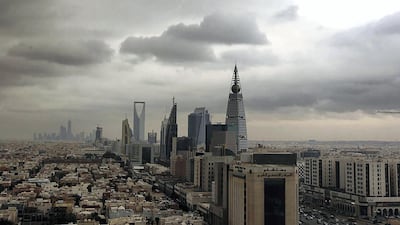Business conditions in Saudi Arabia's non-oil private sector economy continued to expand in February, albeit at a slower pace, as output fell.
The seasonally adjusted Purchasing Managers' Index – a gauge designed to give an overview of operating conditions in the non-oil private sector economy – slipped to 52.5 in February, from 54.9 in January.
The headline index remained above the benchmark 50 level that separates expansion from contraction.
The main factors weighing on Saudi Arabia's PMI were slower rates of output and new business growth across the non-oil private sector in February.
The increase in new work was the weakest over the past 22 months with businesses polled pointing to subdued demand and the need to offer price discounts to stimulate sales.
The bright spot in February was a slight rebound in export orders, with new contracts from abroad rising for the first time in three months.
"The latest survey data highlights a sharp loss of momentum since the start of 2020,” Tim Moore, economics associate director at IHS Markit, said.
"New order growth continued to weaken despite efforts to stimulate sales through price discounting, which led to the weakest rise in non-oil private sector output since the survey began in August 2009.”
February data also revealed additional challenges after the coronavirus outbreak disrupted international supply chains, with companies looking to build inventories and procure critical components from alternative sources.
That has resulted in “longer lead times for the delivery of raw materials and the sharpest rise in purchasing costs for almost one-and-a-half years", Mr Moore noted.
The UAE's non-oil private sector economy, on the other hand, softened for a second month in February as overall business conditions weakened and fewer new orders forced companies to limit activity.
Output expectations in the second-largest Arab economy also dropped to a near two-year low, dampened by fears around the effect the coronavirus outbreak would have on exports and supply chains.
The seasonally adjusted UAE PMI gauge fell to 49.1 in February, down from 49.3 in January.
“The headline reading of 49.1 was the lowest since August 2009, reflecting declines in output, new orders and employment,” David Owen, an economist at IHS Markit, said.
While many companies "remained upbeat for the year ahead", business expectations were hit by fears over the virus outbreak, he said.
UAE output levels contracted for the first time in more than 10 years as demand weakness forced companies to restrict activity. The rate of reduction in output though was only moderate.
Meanwhile, order book volumes decreased for the second month running, with the rate of reduction quickening from January, according to the survey.
Egypt's non-oil private sector also contracted in February for the seventh month in a row, after further declines in output, new orders and employment.
The combination of soft demand and subdued cost pressures meanwhile led companies to reduce average charges for goods and services.
Business sentiment towards future output remained positive but weakened to a five-month low.
At 47.1, the latest IHS Markit Egypt PMI Index reading was up from January's near three-year low of 46 but still indicative of another solid downturn in the non-oil private sector economy.
Faced with weaker demand and reduced output requirements, non-oil companies scaled back employment and purchasing activity in February.
Staffing numbers fell at the fastest rate since September 2017, while the drop in buying was the most marked in almost three years.
"Evidence from the survey indicates a vicious cycle of weak labour market conditions leading to lower domestic sales, and subsequently further staff cuts,” Phil Smith, principal economist at IHS Markit, said.
"Unfortunately for local businesses, the challenging domestic market conditions are being compounded by weakness in external demand, with export orders continuing to fall sharply in February."


